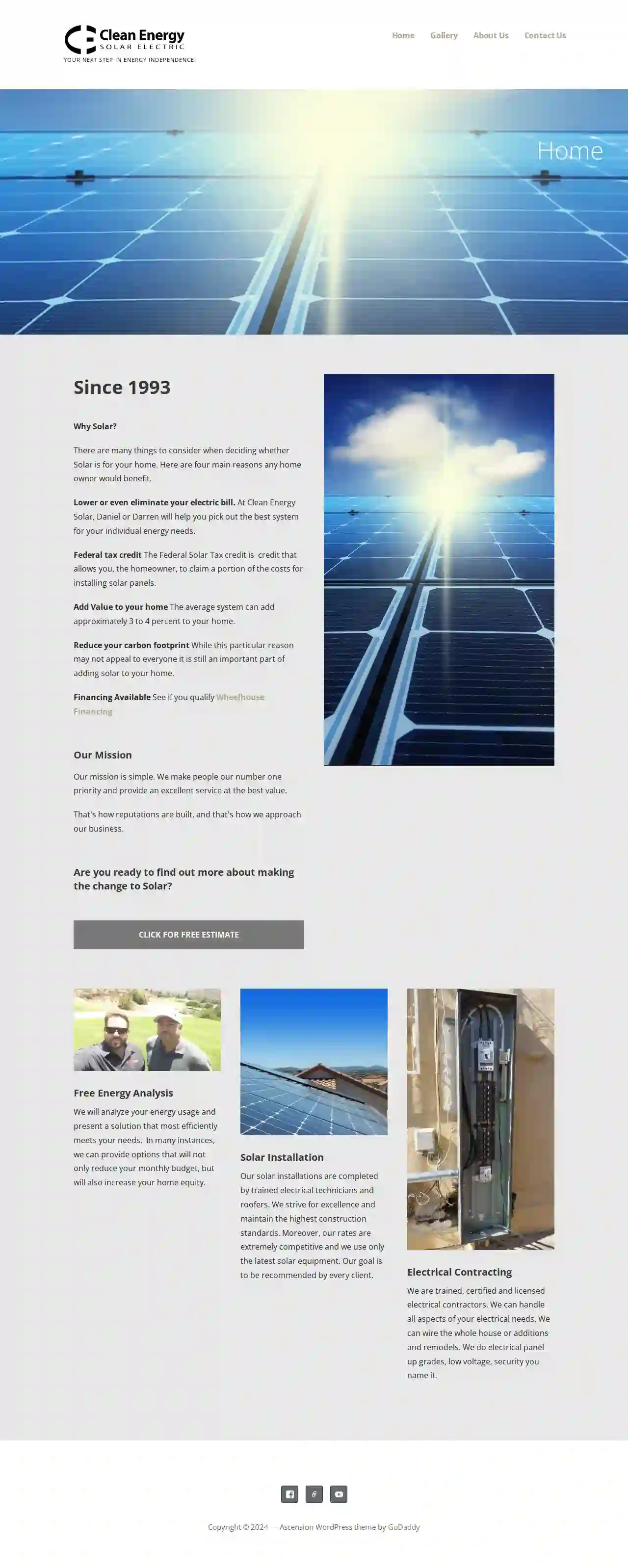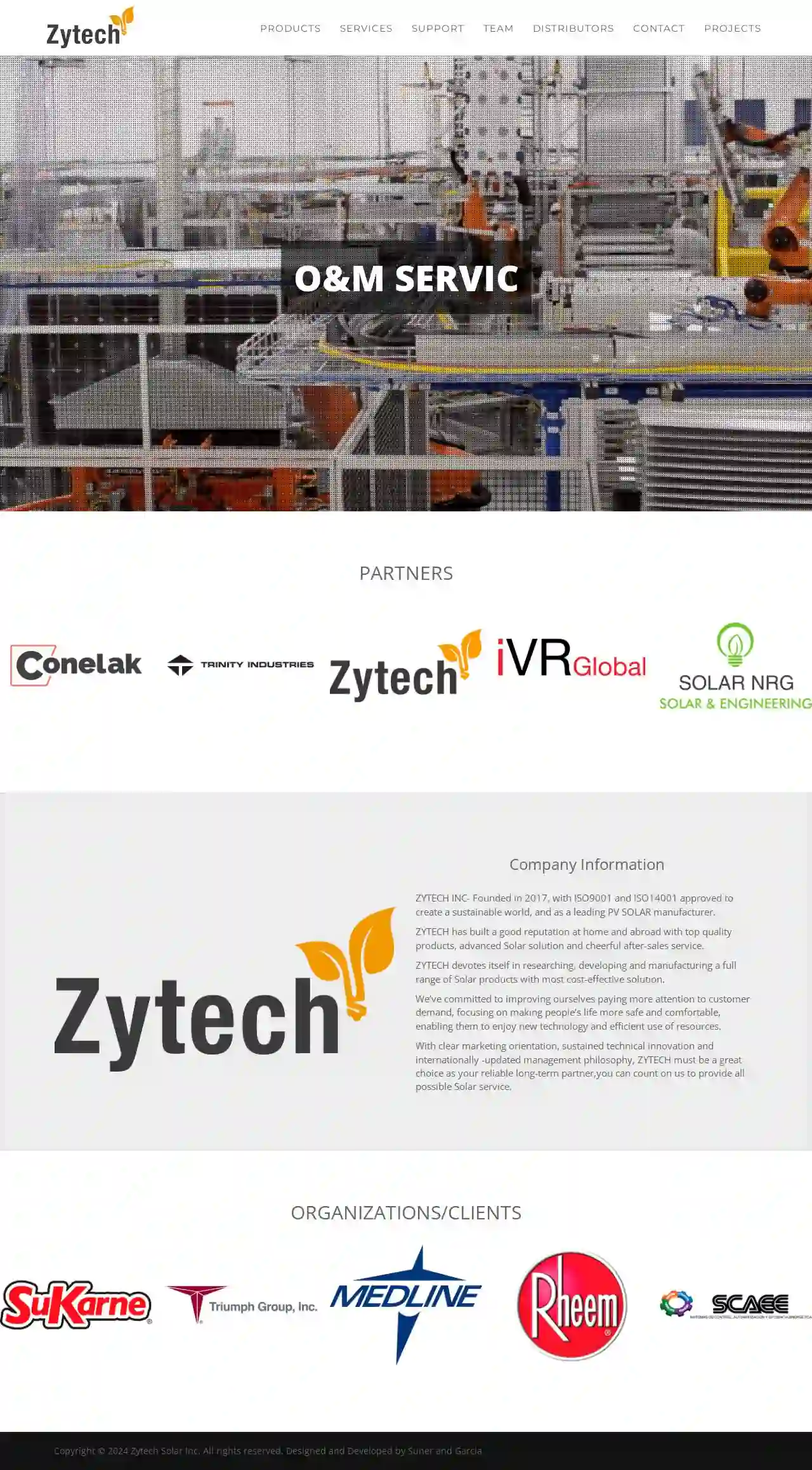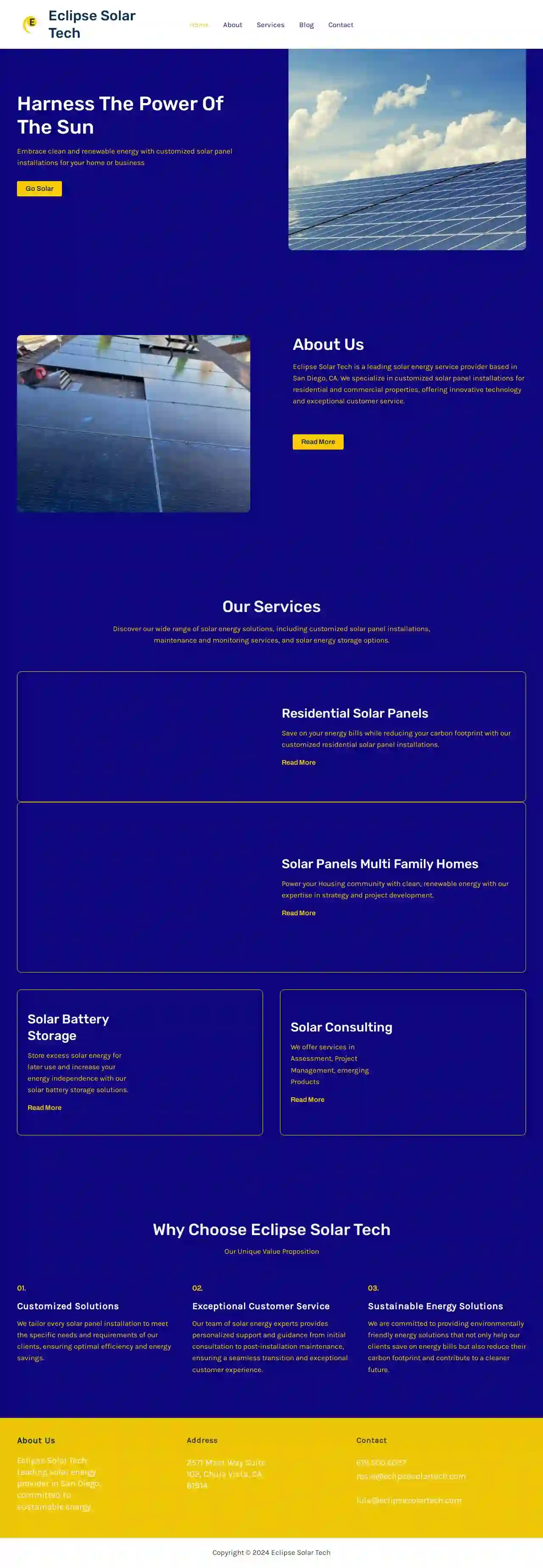Solar Installers Vista
Top Solar Panels For Homes in Vista
Receive up to 3 Solar Installers quotes for your project today! Compare profiles, reviews, accreditations, portfolio, etc... and choose the best deal.

Clean Energy Solar
Vista, USClean Energy Solar is a company that has been in operation since 1993, focusing on providing solar energy solutions to homeowners. Their mission is to prioritize people and provide excellent service at the best value. They offer free energy analysis to help homeowners understand their energy usage and present solutions that can reduce monthly budgets and increase home equity. Their services include solar installation, electrical contracting, and more.
- Services
- Why Us?
- Gallery
Get Quote
Sol Energy Systems LLC
53 reviewsChula Vista, CA, 2380 Fenton st., 91914, USSOL ENERGY SYSTEMS is a leading provider of solar energy solutions, offering a range of services including solar panel installation, energy storage, and roofing. With a focus on providing clean energy solutions, the company aims to help customers take control of their energy needs. Based in Chula Vista, CA, SOL ENERGY SYSTEMS offers inspection and repair services for existing solar systems, as well as solar panel cleaning services.
- Services
- Why Us?
- Accreditations
- Our Team
- Testimonials
- Gallery
Get Quote
Solar by Smart Energy Today
3.811 reviews123 Solar Way, Beverly Hills, 90210, USLumio is a solar energy company that aims to help customers save money, protect the environment, and gain energy independence. They offer a range of services including solar installation, energy savings, and sustainability solutions.
- Services
- Why Us?
- Accreditations
- Our Team
- Testimonials
- Gallery
Get Quote
Zytech Solar INC
Chula Vista, CA, 677 Anita St. Suite B, 91911, USZytech Solar INC is a leading PV SOLAR manufacturer founded in 2017 with ISO9001 and ISO14001 approvals. The company is dedicated to creating a sustainable world through top-quality products, advanced solar solutions, and cheerful after-sales service. Zytech has built a good reputation globally with a focus on customer demand, safety, and comfort. The company is committed to researching, developing, and manufacturing a full range of solar products with cost-effective solutions.
- Services
- Why Us?
- Accreditations
- Our Team
- Gallery
Get Quote
South Bay Solar Cleaning LLC
539 reviewsSan Diego, CA, 123 Solar St, 92101, USSouth Bay Solar Cleaning is a family owned & operated business based in South Bay San Diego, CA. We launched our business in 2020 in the midst of the pandemic with a vision of providing a service to help solar panel owners regain optimal energy from their solar panels. SBSC is the first business in the South Bay dedicated to providing solar panel cleaning & solar panel bird proofing services. South Bay Solar Cleaning has been featured on Business Insider.com, Yahoo News, MSN News, Dailymotion and many more media outlets, showcasing our work and solar cleaning service. We value our customers and dedicate ourselves to providing the utmost professional service possible, all while saving you money.Keeping clean energy clean!
- Services
- Why Us?
- Accreditations
- Our Team
- Testimonials
- Gallery
Get Quote
Solarpro4less LLC
1651 Otay Heights CT, Suite A1-358, San Diego, 92154, USAt SOLARPROFORLESS, we believe in the power of the sun to light up your world. Our team of experienced professionals are dedicated to providing you with a customized solar lighting system that meets your unique needs and preferences. Our high-quality solar lighting products are not only energy-efficient but also environmentally-friendly, helping you reduce your carbon footprint and save money on energy bills. From street lights and garden lights to floodlights and security lights, we have a wide range of products to illuminate any space.
- Services
- Why Us?
- Accreditations
- Our Team
- Gallery
Get Quote
Solar Electric Worldwide
53 reviews123 Solar Way, Beverly Hills, CA, 90210, USSolar Electric is more than just a solar installer – we love solar and we are passionate about what we do. Since the day we started Solar Electric over 20 years ago, we wanted to make sure everything goes right on every solar installation we do. That’s why we do everything in-house and only hire and train the best in the business.
- Services
- Why Us?
- Accreditations
- Our Team
- Testimonials
- Gallery
Get Quote
Family First Solar Electric
51 reviewsSan Diego, CA, 123 Solar Way, 92101, USFamily First Solar Electric is a leading provider of solar panel installation services in San Diego, CA. They offer technologically advanced solar panels and equipment, ensuring timely installation and helping customers save big on their electric bills. They provide a step-by-step guide on how to collect the Federal Investment Tax Credit and Solar Renewable Energy Credits (SRECs).
- Services
- Why Us?
- Accreditations
- Our Team
- Testimonials
- Gallery
Get Quote
Solar Solutions Powur
53 reviewsBeverly Hills, CA, 123 Solar Way, 90210, USAt Powur, we are dedicated to providing sustainable energy solutions through solar power. Our mission is to empower individuals and businesses to make a positive impact on the environment by harnessing the power of the sun. With years of experience in the solar industry, our team of experts is committed to delivering high-quality solar solutions that meet our clients' needs and exceed their expectations. We believe in the importance of renewable energy and strive to make it accessible and affordable for everyone.
- Services
- Why Us?
- Accreditations
- Our Team
- Testimonials
Get Quote
Eclipse Solar Tech
2571 Mast Way Suite 102, Chula Vista, CA 91914, 91914, USEclipse Solar Tech is a leading solar energy service provider based in San Diego, CA. We specialize in customized solar panel installations for residential and commercial properties, offering innovative technology and exceptional customer service.
- Services
- Why Us?
- Gallery
Get Quote
Over 4,210+ Solar Contractors registered
Our solar experts operate in Vista & surroundings!
SolarCompaniesHub has curated and vetted the Best Solar Installers near Vista. Find a top & trustworthy pro today.
Frequently Asked Questions About Solar Installers
- Draw electricity from the grid when your solar panels aren't producing enough power (e.g., at night)
- Sell excess solar electricity back to the grid through net metering.
- Monocrystalline: Made from a single silicon crystal, known for high efficiency (typically 18-22%) and sleek black appearance.
- Polycrystalline: Made from multiple silicon crystals, slightly less efficient (15-17%) but often more affordable than monocrystalline.
- Thin-film: Made from thin layers of photovoltaic material, lower efficiency (8-12%) but can be flexible and lightweight.
- Adequate Sunlight: Unobstructed sunlight for a significant portion of the day.
- Sufficient Space: Enough space to accommodate the desired number of panels.
- Structural Integrity: A strong roof structure capable of supporting the weight of the panels.
- Appropriate Orientation and Tilt: Ideally, the roof should face south (in the Northern Hemisphere) or north (in the Southern Hemisphere) with a tilt angle close to the latitude of your location. However, other orientations and tilts can still be effective.
What is the difference between grid-tied and off-grid solar systems?
What are the different types of solar panels?
How do I know if my roof is suitable for solar panels?
What is net metering, and how does it work?
What is the difference between grid-tied and off-grid solar systems?
- Draw electricity from the grid when your solar panels aren't producing enough power (e.g., at night)
- Sell excess solar electricity back to the grid through net metering.
What are the different types of solar panels?
- Monocrystalline: Made from a single silicon crystal, known for high efficiency (typically 18-22%) and sleek black appearance.
- Polycrystalline: Made from multiple silicon crystals, slightly less efficient (15-17%) but often more affordable than monocrystalline.
- Thin-film: Made from thin layers of photovoltaic material, lower efficiency (8-12%) but can be flexible and lightweight.
How do I know if my roof is suitable for solar panels?
- Adequate Sunlight: Unobstructed sunlight for a significant portion of the day.
- Sufficient Space: Enough space to accommodate the desired number of panels.
- Structural Integrity: A strong roof structure capable of supporting the weight of the panels.
- Appropriate Orientation and Tilt: Ideally, the roof should face south (in the Northern Hemisphere) or north (in the Southern Hemisphere) with a tilt angle close to the latitude of your location. However, other orientations and tilts can still be effective.

